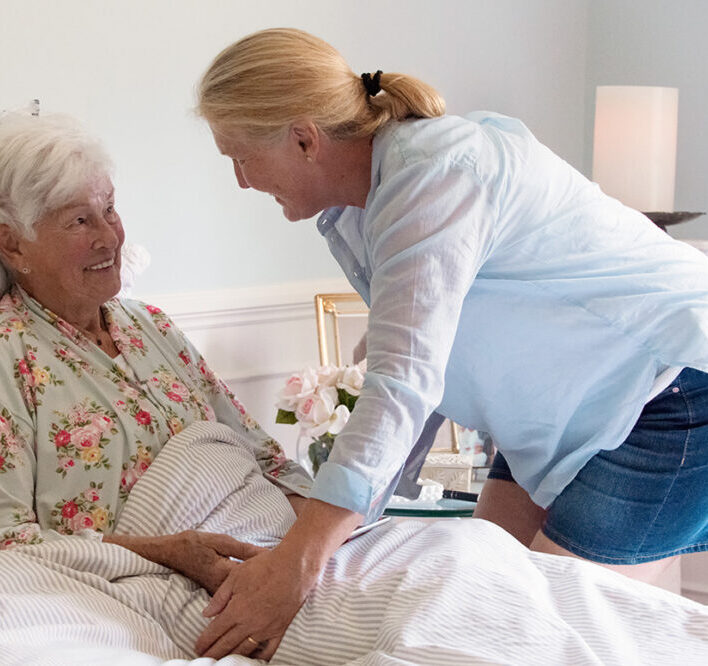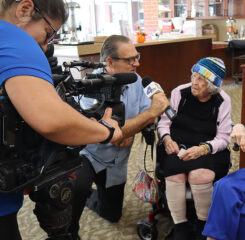LeadingAge Hospice Member Network – September 2022
Hospice Use for Persons with Alzheimer’s and Related Dementia
The Hospice Member Network hosted a conversation with Dr. Kan Gianattasio, a researcher from NORC at the University of Chicago, an independent, nonpartisan research institution. Dr. Gianattasio focused her research on recent hospice payment policy changes and their impact on access to hospice for individuals with Alzheimer’s Disease and related dementias or ADRD. Her published findings looked at three policy changes in hospice: 1) exclusion of diagnoses for failure to thrive and debility, 2) the increased hospice audits for lengths of stay over 180 days required by the IMPACT Act, and 3) the implementation of the two-tiered payment system which reduced routine home care reimbursement after 60 days.
Dr. Gianattasio found that the policy changes did reduce enrollment of ineligible patients, like those with diagnoses of failure to thrive, but there was also a corresponding increase in dementia related enrollments. The response to these policy changes also had a “chilling” effect, reducing and delaying dementia patient enrollments in the benefit. Dr. Gianattasio is planning to publish additional research in the coming year looking at changes in live discharge rates and length of stay associated with these policy changes as well as qualitative research analysis with hospice professionals. In response to member questions about regional variations, Dr. Gianattasio noted that while she did not dive deeper into the data around those variations, it was noted the Northeast did not have large shifts in behavior based on the policy implementations in part because of the Certificate of Need found in many of those states which slowed the growth of new, for-profit agencies.
The group discussed potential policy changes based on the outcomes of the research including looking at extending current hospice terminal illness prognosis from 6 to 12 months as well as looking at concurrent care models and upstream palliative care access. Another potential change could be shifting the benefit to focus on prognosis based on clinical criteria and looking at the needs of the individual and their goals for care.
COVID PHE Updates and Request for Information
Staff updated members on the most recent changes to COVID-19 hospice waiver flexibilities which provided more detailed information on the lead time to resume pre-pandemic hospice operations. Most members continued on-site visits with hospice aides and continued annual training requirements. More concerning was the volunteer hours waiver which allows hospices to waive the 5% volunteer hours requirement. The updated guidance stated the waiver would terminate with the end of the public health emergency with no detailed transition time. All members had maintained their volunteer recruitment and training programs, but several were concerned about reaching the 5% threshold when the pandemic ended as well as what the future of hospice volunteering would look like. Many shared they were struggling to find volunteers interested in direct patient care for in-patient settings due to COVID outbreak concerns and requirements for vaccinations. Members stated they needed more guidance from CMS on how to treat volunteers regarding vaccination requirements especially in nursing home settings.
Members also discussed current strategies for finding volunteers. Several said word-of-mouth worked well and for those associated with a Life Plan Community they often recruited volunteers from independent living to support hospice patients in their in-patient settings. Others found social media to be useful to reach the broader community. Still others were having trouble finding volunteers who could commit to consistent hours and volunteers willing to attend the required training. Several members felt additional education would be helpful to revive their programs.
The group also discussed recent survey activity. There was some discussion of whether the accreditation surveys became more challenging with the implementation of new survey remedies for deficient hospices. For those agencies who recently went through a survey with the Joint Commission, they did not feel there was a significant difference. The surveyors focused on quality improvement activities, infection control especially when staff interacted with patients, and reviews of vaccine exemptions. There was also an emphasis on emergency preparedness and aide oversight.
Policy Update
Hospice CAHPS Five Star Rating: In August, CMS updated the Hospice Compare website for the first time with hospice CAHPS Five Star Ratings. Staff encouraged members to review their published Five Star Rating and noted some member shared concerns regarding the quality care measures being harder to find.
LeadingAge Comments on Outpatient Perspective Payment System: On September 13th, LeadingAge submitted comments on the CY 2023 Medicare Hospital Outpatient Prospective Payment System and Ambulatory Surgical Center Payment System Proposed Rule’s Request for Comment on Use of CMS Data to Drive Competition in Healthcare Marketplaces. In the comment letter, LeadingAge discusses the growth of the for-profit home health and hospice sector and the influence of private equity in the space. LeadingAge asks CMS to make data on mergers, acquisitions, consolidations, and changes of ownership public for Medicare certified home health agencies and hospices in order to improve transparency and provide researchers with the tools to analyze the impact of ownership on the quality of care beneficiaries receive.

Most Recommended
November 08, 2024
 HOTMA: New Rules for Housing
HOTMA: New Rules for Housing
November 06, 2024
 Colleagues on the Move, November 6, 2024
Colleagues on the Move, November 6, 2024
November 06, 2024
 Analysis: What Does the Final CY2025 Home Health Rule Include?
Analysis: What Does the Final CY2025 Home Health Rule Include?
October 29, 2024
Katie Smith Sloan Urges Members to Build a Movement, Take Action
Recently Added
December 10, 2024
4 Top Tech Themes from 2024
December 09, 2024
 Analysis: What’s Changing with the Home Health CAHPS Survey?
Analysis: What’s Changing with the Home Health CAHPS Survey?
December 09, 2024



